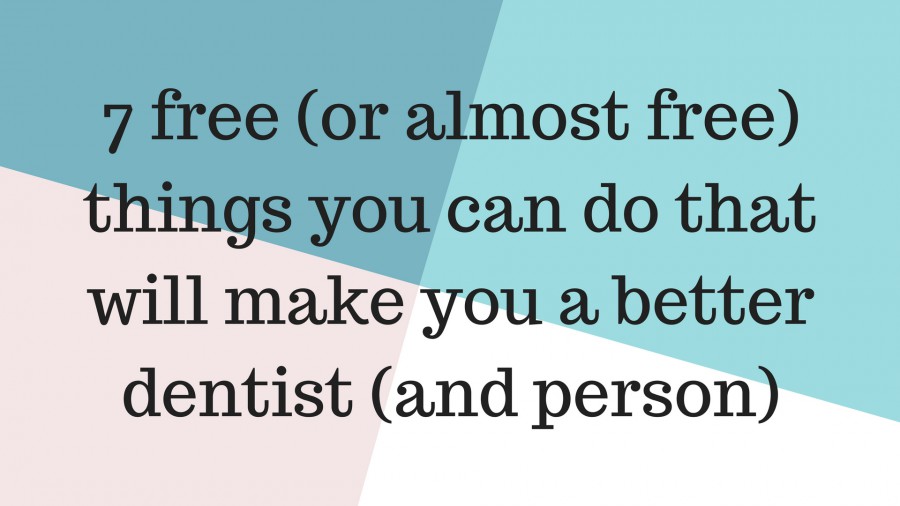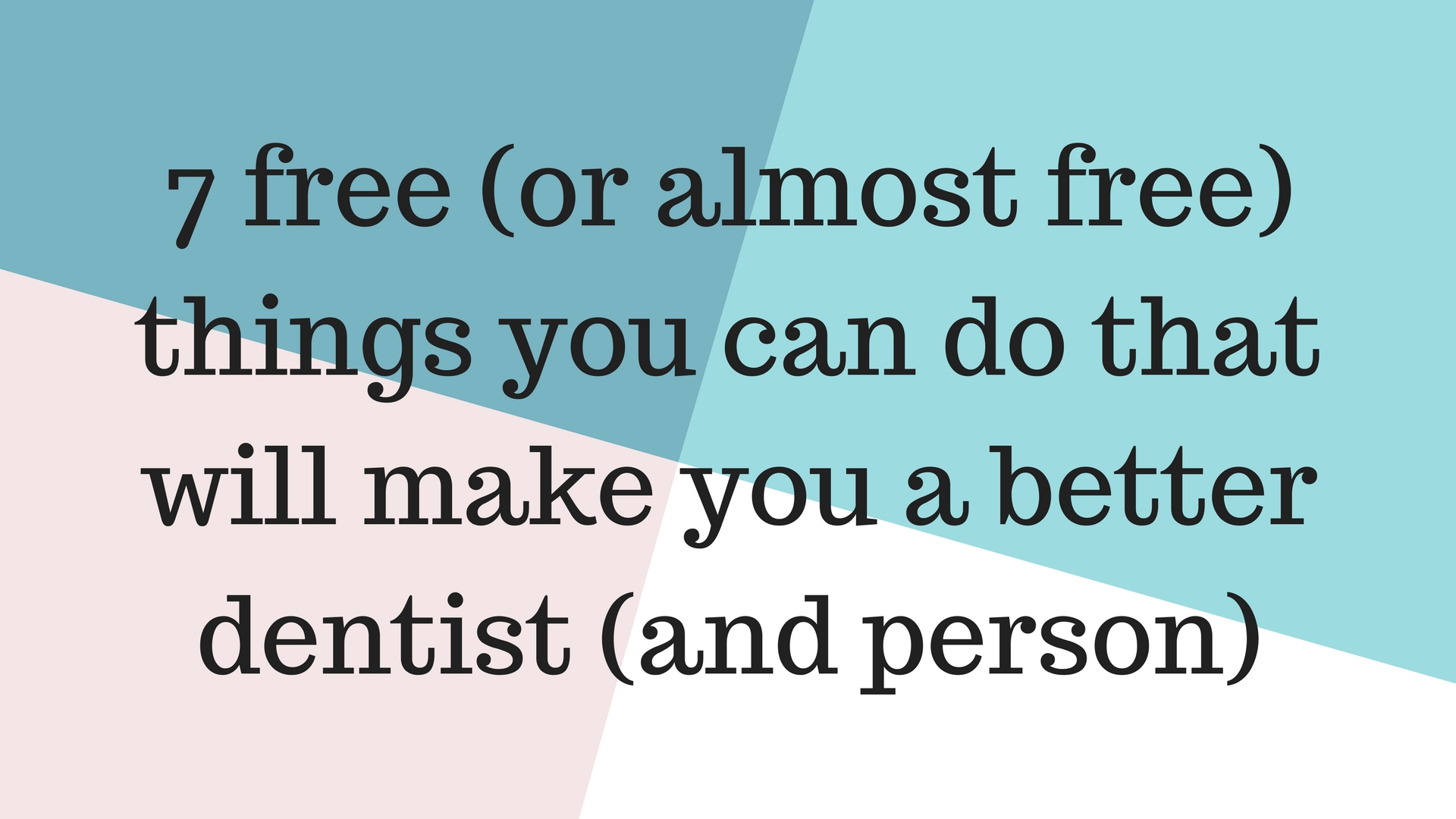
 As dentists we’re constantly looking to make ourselves better. Whether it’s that new piece of equipment or a new procedure, we’re looking for constant improvement. Onward and upward!
As dentists we’re constantly looking to make ourselves better. Whether it’s that new piece of equipment or a new procedure, we’re looking for constant improvement. Onward and upward!
These things usually cost a bunch, though. My ability to diagnose increases significantly with a cone beam CT in the office. For a mere $100k, I will be a diagnostic super hero. I get it. Getting better has a price, right? Well…not always. There are some really inexpensive things you can do to become a significantly better dentist.
- read: Our ability to communicate is really important. As dentists. As parents. As humans. Much of our communication depends on language and our ability to use and understand language. With this in mind…when was the last time you took any kind of course in language arts? I know you’ve taken treatment planning courses, implant placement courses, veneer courses, business management courses and on. And on. I get it. Dentists don’t take courses in language. We’re just automatically great at it, right? Ummmm. No. This is why you should read. I personally have a hard time sitting down and reading books with my eyes. I’m more of a blog post reader or the occasional newspaper reader. Books are fantastic, though. I’m actually OK with comic books. Regular reading is kind of like a quick refresher course in using the language and it helps you use part of your brain that doesn’t necessarily get engaged with other kinds of media.
- learn to meditate: I know what you’re thinking. “Meditating is for hippies. I’m not sitting cross legged and saying “om” to the universe. I’ve got things to do.” I thought this, too. For me, meditation has been a really healthy habit. I’m not perfect about making time for it, but I find my days get better when I do. All human beings are emotional creatures. You may not think of yourself as emotional, but remember being angry or stressed…that’s your emotions. Much of my stress and anxiety is linked to not recognizing my feelings. It sounds silly, but just recognizing that you’re feeling a certain way is enough to help move through it. Much of the time we’re too busy to think about the actual emotions we experience. Meditation and mindfulness is ALL about this. I’ve learned a lot from my friend Dr. Dawn Kulongowski and her private Facebook group for dentists. You should check it out.
- listen to podcasts: Yes, this is self serving. But it isn’t wrong. I am a podcaster. I have two dental podcasts that you should be listening to. The Dental Hacks podcast is the show I’ve been doing with my friend Dr. Jason Lipscomb for 3 years. It’s fun, it’s informative and it’s free. The Alan Mead Experience is a new show that I started last month. It focuses on conversation and storytelling. I love them both. But if you don’t like those, there are 50+ podcasts about dentistry available on iTunes or most other podcast listening software. There’s something for everyone. Podcasts are great because they make time that’s often not productive (working out, driving to work, mowing the lawn) into a chance to learn and hear some different perspectives. Podcasts are awesome.
- write: Many people that communicate very well through speech struggle with similar communication through writing. The spoken word is more comfortable for most people because the ear is more forgiving and so much of spoken communication is nonverbal through tone, expression and even hand gestures. Writing is harder. But it’s still really important. The good news…the writing muscle gets stronger with exercise. The more you write, the easier it will get and the better you’ll be at it. So spend some time writing. Write a letter to someone you haven’t talked with in awhile. When was the last time you got a letter from someone? It’s guaranteed to make someone’s day. Start a blog. Write a novel. Again…it doesn’t matter so much what you write as much as you give those muscles a little workout.
- take photos: You’re thinking “that’s not free. You said the stuff was free!” True. You can spend a bunch of money on clinical photography set ups. But you don’t have to. If the Kois Center is recommending that you use a smartphone or tablet to take your intake images, that should be good enough for you! If you take photos (or even video) of your work, you will get better. End of story. There is nothing more frustrating (or educational) than taking photos of the perfect resin you just placed only to see some flash you missed or some anatomy that looks less than ideal that you just didn’t see clinically. Taking photos makes you better. Period.
- take time off: I’m terrible at this. Seriously. Most of the time I take off from work involves dental CE. That’s pathetic. There’s something magical about having time away from the office and NOT doing dental stuff. I’m in the middle of a week off from work that has been incredibly energizing. I’m essentially doing work around my house and single parenting my children. Knowing that there is life outside of your dental office and that the whole world doesn’t end when you’re not in the office is valuable. It makes you better when you’re there and it helps make you realize that you’re human before you’re a dentist.
- have lunch with local colleagues: I have a ton of dental colleagues. Many of them are from “away.” I interact with dentists across the country and across the world on a daily basis because of podcasting, blogging and social media. I’ve learned much of what I do in my office from people I’ve actually never met in person. However…there is something to having regular interaction with your local colleagues, too. I generally don’t think of local dentists as competition. It doesn’t serve me well and frankly, we compete against other things patients can spend money on (smartphones, lawn tractors) much more than other dentists. It’s really great to be able to communicate or commiserate with a real live person. Having local colleagues that you can lean on for second opinions and referrals is really important. Plus, it helps you realize that you’re doing OK, even though you aren’t posting all of your cases on Style Italiano or Tomorrow Tooth.
So there you have it. You don’t have to pay an arm and a leg to improve yourself or your dentistry. And a lot of these suggestions can help you be a better human being, too. Which is a pretty good side benefit, right?
If I missed any please email me or leave some suggestions in the comments section. If you found this helpful, please share it!